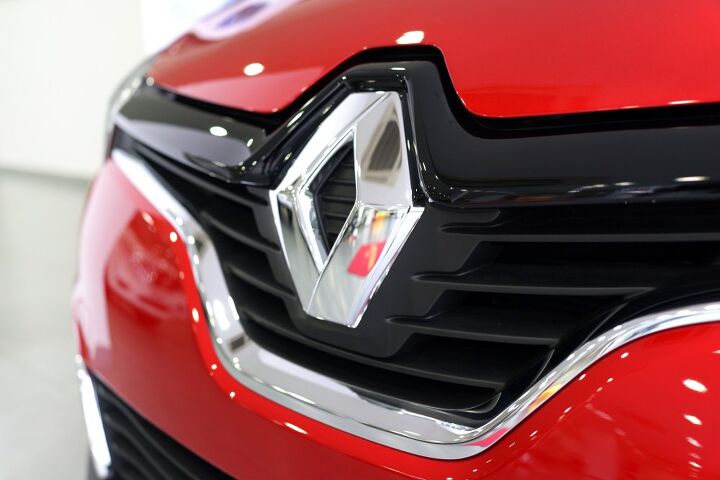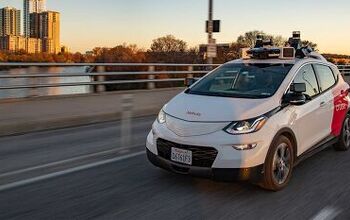Renault Reports Staggering $8.6 Billion Loss

Already in the midst of a comprehensive restructuring plan with partners Nissan and Mitsubishi, Renault announced a staggering 7.29 billion euro ($8.6 billion) loss on Thursday. That tally encapsulates the first half of the year and marks a new record for the brand, even if it’s not the kind one normally celebrates.
“Although the situation is unprecedented, it is not final. Together with all of the Group’s management teams and employees, we are fully dedicated to correcting the situation through a strict discipline that will go beyond reducing our fixed costs,” new CEO Luca de Meo said in response to the dismal financial report. “Preparing for the future also means building our development strategy, and we are actively working on this. I have every confidence in the Group’s ability to recover.”
Unveiled in May, Renault’s latest recovery proposal involves cutting production capacity by around 20 percent and telling nearly 15,000 employees to take a hike. Eventually, that’s supposed to help the brand save 2 million smackers — which would have been a lot more helpful if it didn’t just post its worst period on record. Some of that failure belongs to Nissan, however.
According to Bloomberg (via Automotive News), the Japanese brand’s weak performance reduced Renault’s net income by a total of 4.8 billion euros ($5.6 billion) in the first and second quarters. On the upside, Renault still has healthy cash reserves and continued investment from the French government.
From Bloomberg:
The company reported a group operating loss of 2 billion euros ($2.4 billion) in the first half, compared with income of 1.52 billion euros a year earlier and said the automotive cash burn was 6.4 billion euros ($7.5 billion). Renault turned to its most powerful shareholder, the French state, for help during the health crisis, accepting a government-backed credit facility of 5 billion euros ($5.9 billion).
At the end of June, the automaker said it held 16.8 billion euros ($19.7 billion) of liquidity, compared with 10.3 billion euros on March 30.
Renault shares fell nearly 9 percent on Thursday and have fallen 47 percent this year. Meanwhile, sales are about one-third of what they were during the same period in 2019. Considering Nissan’s similarly poor performance and dwindling share price, we may have to consider putting both on deathwatch. Expect an update as the duo prepare to revise their restructuring program and attempt to salvage what’s left of their existing partnership.
[Image: TY Lim/Shutterstock]

A staunch consumer advocate tracking industry trends and regulation. Before joining TTAC, Matt spent a decade working for marketing and research firms based in NYC. Clients included several of the world’s largest automakers, global tire brands, and aftermarket part suppliers. Dissatisfied with the corporate world and resentful of having to wear suits everyday, he pivoted to writing about cars. Since then, that man has become an ardent supporter of the right-to-repair movement, been interviewed on the auto industry by national radio broadcasts, driven more rental cars than anyone ever should, participated in amateur rallying events, and received the requisite minimum training as sanctioned by the SCCA. Handy with a wrench, Matt grew up surrounded by Detroit auto workers and managed to get a pizza delivery job before he was legally eligible. He later found himself driving box trucks through Manhattan, guaranteeing future sympathy for actual truckers. He continues to conduct research pertaining to the automotive sector as an independent contractor and has since moved back to his native Michigan, closer to where the cars are born. A contrarian, Matt claims to prefer understeer — stating that front and all-wheel drive vehicles cater best to his driving style.
More by Matt Posky
Latest Car Reviews
Read moreLatest Product Reviews
Read moreRecent Comments
- Lorenzo Nice going! They eliminated the "5" numbers on the speedometer so they could get it to read up to 180 mph. The speed limit is 65? You have to guess one quarter of the needle distance between 60 and 80. Virtually every state has 55, 65, and 75 mph speed limits, not to mention urban areas where 25, 35, and 45 mph limits are common. All that guesswork to display a maximum speed the driver will never reach.
- Norman Stansfield Automation will make this irrelevant.
- Lorenzo Motor sports is dead. It was killed by greed.
- Ravenuer Sorry, I just don't like the new Corvettes. But then I'm an old guy, so get off my lawn!😆
- Lorenzo Will self-driving cars EVER be ready for public acceptance? Not likely. Will they ever by accepted by states and insurance companies? No. There must be a driver who is legally and financially liable for whatever happens on a public thoroughfare. Auto consumers are not afraid of the technology, they're afraid of the financial and legal consequences of using the technology.


































Comments
Join the conversation
When Carlos Tavares was working for Renault, he voiced the desire to some day run a car company. Carlos Ghosn knew a potential rival when he saw one, and got rid of Tavares, who went to the other French car maker, PSA. Ghosn went to jail, escaped, and is now a fugitive. Tavares engineered the purchase of money-losing Adam Opel from GM, and ruthlessly cut costs enough to make Opel modestly profitable. He did the same with the Peugeot and Citroen divisions, and is now halfway to merging with Fiat-Chrysler. Had Tavares remained with Renault and exercised similar cost cutting there and with Nissan and Mitsubishi as part of the alliance, Those companies would have been in far better shape. Meanwhile, the Peugeot family who still owns a chunk of PSA is happy that Tavares is on the verge of making them much wealthier stockholders of a soon to be much bigger, financially sound global car company.
Hmmm, it looks like PSA might end up as the sole surviving French(ish) auto maker.